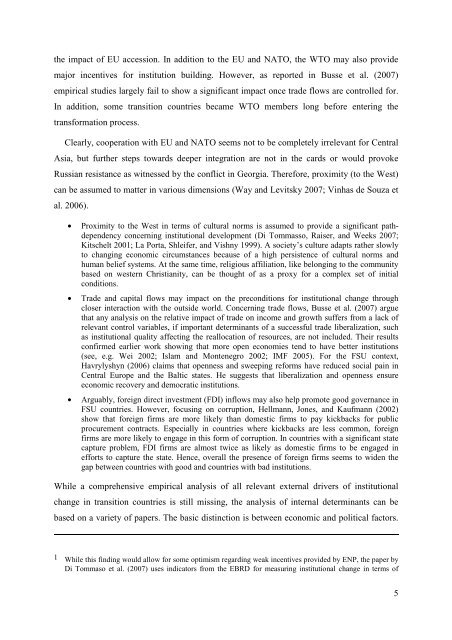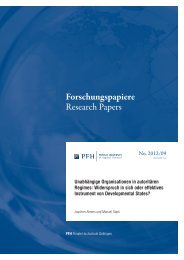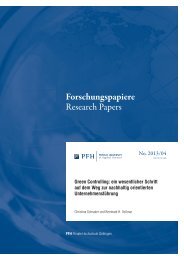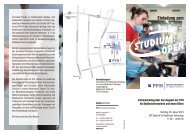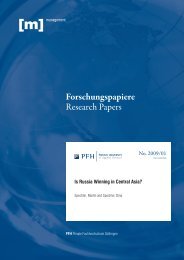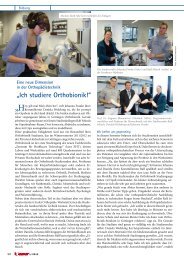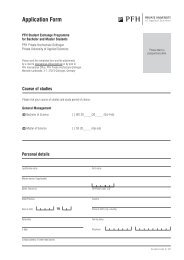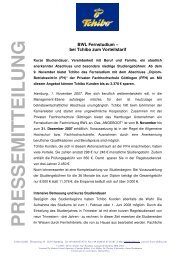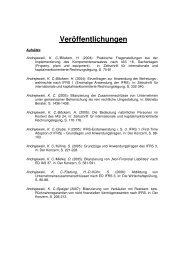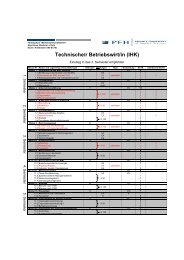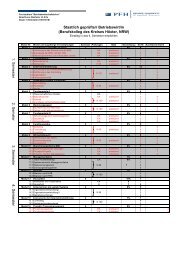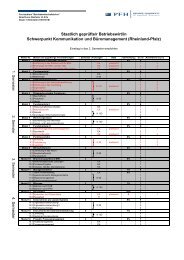View - PFH Private Hochschule Göttingen
View - PFH Private Hochschule Göttingen
View - PFH Private Hochschule Göttingen
Create successful ePaper yourself
Turn your PDF publications into a flip-book with our unique Google optimized e-Paper software.
the impact of EU accession. In addition to the EU and NATO, the WTO may also provide<br />
major incentives for institution building. However, as reported in Busse et al. (2007)<br />
empirical studies largely fail to show a significant impact once trade flows are controlled for.<br />
In addition, some transition countries became WTO members long before entering the<br />
transformation process.<br />
Clearly, cooperation with EU and NATO seems not to be completely irrelevant for Central<br />
Asia, but further steps towards deeper integration are not in the cards or would provoke<br />
Russian resistance as witnessed by the conflict in Georgia. Therefore, proximity (to the West)<br />
can be assumed to matter in various dimensions (Way and Levitsky 2007; Vinhas de Souza et<br />
al. 2006).<br />
• Proximity to the West in terms of cultural norms is assumed to provide a significant pathdependency<br />
concerning institutional development (Di Tommasso, Raiser, and Weeks 2007;<br />
Kitschelt 2001; La Porta, Shleifer, and Vishny 1999). A society’s culture adapts rather slowly<br />
to changing economic circumstances because of a high persistence of cultural norms and<br />
human belief systems. At the same time, religious affiliation, like belonging to the community<br />
based on western Christianity, can be thought of as a proxy for a complex set of initial<br />
conditions.<br />
• Trade and capital flows may impact on the preconditions for institutional change through<br />
closer interaction with the outside world. Concerning trade flows, Busse et al. (2007) argue<br />
that any analysis on the relative impact of trade on income and growth suffers from a lack of<br />
relevant control variables, if important determinants of a successful trade liberalization, such<br />
as institutional quality affecting the reallocation of resources, are not included. Their results<br />
confirmed earlier work showing that more open economies tend to have better institutions<br />
(see, e.g. Wei 2002; Islam and Montenegro 2002; IMF 2005). For the FSU context,<br />
Havrylyshyn (2006) claims that openness and sweeping reforms have reduced social pain in<br />
Central Europe and the Baltic states. He suggests that liberalization and openness ensure<br />
economic recovery and democratic institutions.<br />
• Arguably, foreign direct investment (FDI) inflows may also help promote good governance in<br />
FSU countries. However, focusing on corruption, Hellmann, Jones, and Kaufmann (2002)<br />
show that foreign firms are more likely than domestic firms to pay kickbacks for public<br />
procurement contracts. Especially in countries where kickbacks are less common, foreign<br />
firms are more likely to engage in this form of corruption. In countries with a significant state<br />
capture problem, FDI firms are almost twice as likely as domestic firms to be engaged in<br />
efforts to capture the state. Hence, overall the presence of foreign firms seems to widen the<br />
gap between countries with good and countries with bad institutions.<br />
While a comprehensive empirical analysis of all relevant external drivers of institutional<br />
change in transition countries is still missing, the analysis of internal determinants can be<br />
based on a variety of papers. The basic distinction is between economic and political factors.<br />
1 While this finding would allow for some optimism regarding weak incentives provided by ENP, the paper by<br />
Di Tommaso et al. (2007) uses indicators from the EBRD for measuring institutional change in terms of<br />
5


